History - Class 9
Our Past - I
Chapter 3: Nazism and the Rise of Hitler
Activity: 1
Question 1: Read Sources A and B
- What do they tell you about Hitler’s imperial ambition?
- What do you think Mahatma Gandhi would have said to Hitler about these ideas?
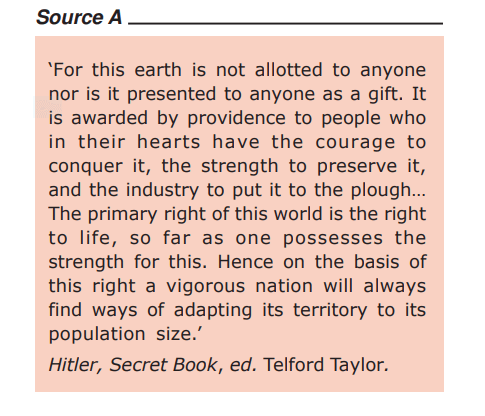
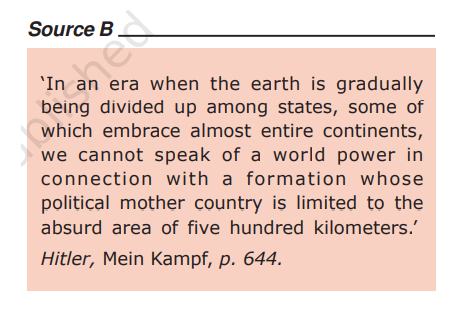
Answer:
- What do they tell you about Hitler’s imperial ambition?
Answer: The two texts tell that Hitler’s imperial ambition was to expand the boundaries of Germany till wherever they could possibly reach. He believed that an aggressive nation will find methods to adjust its territory to its population’s size. In source ‘B’ he was comparing Germany’s size to that of Russia and wanted Germany to become a world power of similar size.
- What do you think Mahatma Gandhi would have said to Hitler about these ideas?
Answer: Mahatma Gandhi would have told Hitler to remove the idea of aggression against other nations from his mind, as violence begets violence.
Activity: 2
See the next two pages and write briefly:
Question 2: What does citizenship mean to you? Look at Chapters I and 3 and write 200 words on how the French Revolution and Nazism defined citizenship.
Answer: To me, citizenship means the right to live freely in the country of my birth or the country where I desire to live. The French Revolution defined citizenship in a way which was different from the way that the Nazism defined it. The French people thought that all men have equal rights as they are born equal. The rights of a citizen include liberty, security, owning of property and resisting oppression. Also they believed in the freedom of expression, whether verbal or in writing, art, etc. They believed in the rule of law and that no one can be above it.
However, the Nazi definition of citizenship was quite different. It was defined with the perspective of racial discrimination against all except the ‘pure Aryan’ Nordic race. So they said that Jews and other ‘undesirable population would not be considered as citizens of Germany. These people were given very harsh treatment like death in the gas chamber or banishment to concentration camps. Many of them were forced to flee to other countries because of this.
Question 3: What did the Nuremberg Laws mean to the ‘undesirables’ in Nazi Germany? What other legal measures were taken against them to make them feel unwanted?
Answer: Basically, the Nuremberg Laws meant that the ‘undesirables’ had no rights to live along with the other citizens. These included Jews, Gypsies, ‘Blacks’ and other nationalities like Polish and Russian people.
These laws, promulgated in 1935, stated
- Only persons of German or related blood would be German citizens, enjoying the protection of the German Empire.
- Marriages between Germans and the ‘undesirables’ were forbidden. Extramarital relations between them also became a crime.
Other legal measures included
- Boycott of Jewish businesses.
- Expulsion of Jews from government services.
- Confiscation and forcible selling of the properties of Jews.
Activity: 3
Question 4: If you were a student sitting in one of these classes, how would you have felt towards Jews?
Answer: If I had been a student sitting in one of these classes, I would have felt very bad, as I would be missing my friends, who used to play with me earlier. I would have felt sympathetic towards them and would have hated the government for this action.
Question 5: Have you ever thought of the stereotypes of other communities that people around you believe in? How have they acquired them?
Answer: I have thought about the stereotypes of other communities they believe in. They are usually acquired from their ancestors and the traditions and customs of the community to which they belong.
Activity: 4
Question 6: Look at Figs. 23, 24, and 27. Imagine yourself to be a Jew or a Pole in Nazi Germany. It is September 1941, and the law forcing Jews to wear the Star of David has just been declared. Write an account of one day in your life.
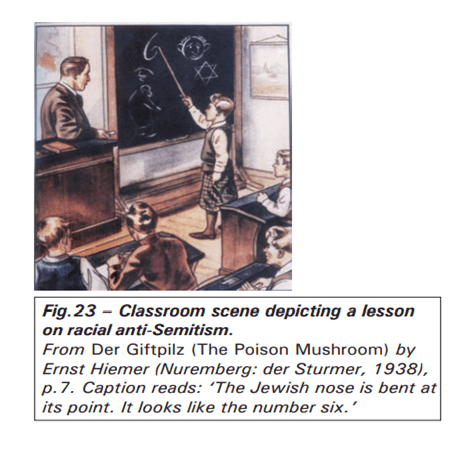
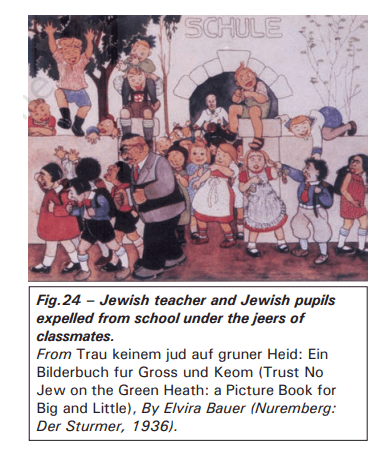
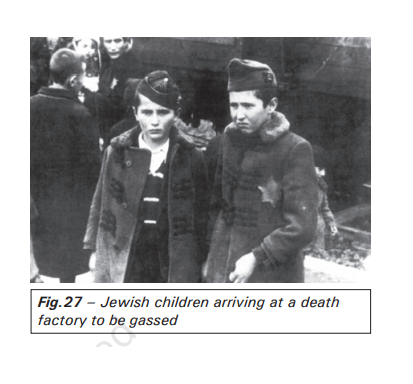
Answer: Germany decreed that Jews over the age of six were required to wear a yellow Star of David on their outer clothing in public at all times.The Nazis in Germany and throughout German-occupied Europe implemented the yellow star as a means to publicly identify, humiliate, and isolate Jews. In many cases, this public identification and stigmatization preceded the mass deportations of Jews to ghettos and killing sites.
On September 1, 1941, the Reich Minister of the Interior decreed that Jews over the age of six in the Greater German Reich were required to wear a yellow Star of David on their outer clothing in public at all times. While ghettos were generally not established in Germany, strict residence regulations forced Jews to live in designated areas of German cities, concentrating them in “Jewish houses” (“Judenhäuser”).
Within Germany, the sight of neighbors forced to wear the yellow badge often elicited sympathy from non-Jewish Germans. This response was widespread enough that the Ministry of Propaganda and Enlightenment felt compelled to issue pamphlets instructing Germans on how they should respond when encountering neighbors wearing the yellow star.Activity: 5
Question 7: How would you have reacted to Hilter’s ideas if you were:
- A Jewish woman
- A non-Jewish German woman
Answer:
- If I was a Jewish woman, I would have condemned these ideas as they were against our community and also against women.
- If I was a non-Jewish German woman, I would have condemned them as being too restrictive to women’s roles in life. Also, I do not agree with Hitler about the idea of Jews being ‘undesirable’, as I have a number of Jewish women as my friends and I find them likeable, just like other human beings. They should not be called ‘undesirables’.
Activity: 6
Question 8: What do you think this poster is trying to depict?
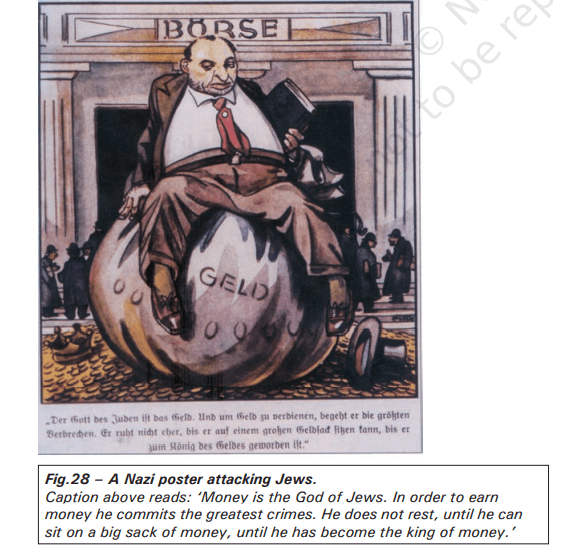
Answer: The poster is making fun of Jews, by depicting that they are only interested in making money, by whatever means at their disposal. It is trying to show that Jews are greedy. The fatness of the man depicted indicates that the poster maker felt that the greed of Jews is excessive.
Activity: 7
Question 9: Look at Figs. 29 and 30 and answer the following: What do they tell us about Nazi propaganda? How are the Nazis trying to mobilize different sections of the population?

Answer: The first poster is addressed to the German farmer, while the second one is addressed to the German worker. This tells us that through this kind of propaganda, the Nazis were trying to win the support of the working classes. The second poster is telling them to vote for Hitler, who has fought on the front line in the First World War. The first poster is condemning the Capitalists and the Bolsheviks, because they are the enemies of Nazism. By this method, the Nazis tried to mobilise different sections of the population to their cause.
Activity: 8
Question 10: Why does Erna Kranz say, ‘I could only say for myself’? How do you view her opinion?
Answer: She said this because at that time, she personally felt that the economy was being revived. However, since she was not able to see the conditions of others at that time, being too young to go out and see what was happening elsewhere. Her opinion may be correct as far as she was concerned, but as she had no idea about what was happening in the rest of the country, it is difficult to say whether others felt similarly.
Activity: 9
Question 11: Write a one page history of Germany
- as a schoolchild in Nazi Germany
- as a Jewish survivor of a concentration camp
- as a political opponent of the Nazi regime
Answer:
- As a Schoolchild in Nazi Germany:
I have been conditioned to behave in a particular manner since I was three years old. First I was given a flag to wave, to show my patriotism. I was told that men’s and women’s roles in life were totally different. We were told that the fight for equal rights of men and women was a thing of the past as it would destroy our society today. We boys were taught to be aggressive, masculine and steel hearted, while the girls were told that they had to become good mothers and rear pure-blooded Aryan children.
The girls had to maintain the purity of the race, distance themselves from Jews, look after the home, and teach their children Nazi values .They had to be the bearers of the Aryan culture and race. I had to take an oath of loyalty to Hitler, proclaiming him as the savior of the country. I have been told that after finishing school, I will join the Hitler Youth Organization. This will be followed by military service, which is compulsory. - As a Jewish Survivor of a Concentration Camp:
Thanks to the Lord for saving my life. I am happy to have survived three years of torturous life in the concentration camp. Of course, I am now very weak and ill, but I am still alive. So many of my friends, relatives even family members died before my eyes due to the bad treatment meted out to them in the camp. They were regularly beaten, left to starve and worked in very harsh conditions. Many of them were sent to the gas chambers and l was always afraid of my number coming next. Luckily I have survived to tell this tale. - As a Political Opponent of the Nazi Regime:
Since the Nazis have captured power, they are making life hell for all people who do not follow their doctrine. I do not understand what they will gain by trying to conquer other nations. The bombing by the British on our homes has killed many of my relatives and friends.
Aggression on other countries will definitely cause war with them and we will also lose men and property in war. The way the Nazis are going about increasing their power, I feel, in the long run, we will lose out, as this war will make all other nations to go against us. I hope Hitler sees sense and stops this war soon.
Question 12: Imagine that you are Helmuth. You have had many Jewish friends in school and do not believe that Jews are bad. Write a paragraph on what you would say to your father.
Answer: If I was helmuth i would tell my father that jews were very good people. They don’t discriminate people as the nazis do. They are very polite. They bare the cruel torture of the nazis but still they don’t raise their voice against them. They do their work obediently. I’m very lucky to have friends who are jews.
Questions
Question 13: Describe the problems faced by the Weimar Republic.
Answer: After the defeat of Imperial Germany, the Weimar Republic came into existence. The Republic had a democratic constitution and a federal structure. The Republic was not well received by the people.
The Weimar Republic faced many problems on all fronts- economic, social, and political. It was held responsible for the defeat in the First World War. The Republic had to pay war compensation and this put the Republic in deep financial crisis. Germany had fought the war largely on loans and had to pay war reparations in gold. Subsequently, gold reserves depleted and the value of the German Mark fell. The prices of essential commodities rose dramatically. The constitution gave the President the powers to impose emergency, suspend civil rights, and rule by decree. The Weimar Republic faced problems on the political front also. The constitution had cabinets within a short span of time. Soon people lost confidence in the democratic parliamentary system.
Question 14: Discuss why Nazism became popular in Germany by 1930.
Answer: Nazism became popular in Germany by 1930 in the following manner.
- The crisis in the economy, politics and society led to the rise of Hitler. He joined the German Workers’ party in 1919 and took its organization. He renamed it the National Socialist German Workers’ Party. It came to be known as the Nazi Party.
- Nazism became a mass movement during the Great Depression. After 1929 banks closed, workers lost their jobs and the middle class was threatened with poverty. Nazi propaganda gave hope of a better future. By 1932, the Nazi Party became the largest party in the Reichstag with 37 percent votes.
- Hitler was a powerful speaker. He could draw the attention of the people. He promised to build Germany into a strong nation, wipe out the humiliation of the Treaty of Versailles and restore the dignity of the Germans. He promised employment and better future for the youth.
- He understood the importance of show-biz. Massive rallies were held where he addressed the SA and SS columns. Public meetings were held to show support for Hitler and instill unity among the people.
The red banners with the Swastika, Nazi salute, the ritualized round of applause were part of all meetings. Hitler was projected as a savior, who would end all misery and restore the dignity of Germany and the German people.
Question 15: What are the peculiar features of Nazi thinking?
Answer: Nazi ideologies were:
- There is no equality among people.
- The Nordic German Aryans were the best race.
- The Jews were considered the lowest rate.
- Nazism believed in the survival of the fittest.
- New territories had to be captured to enhance the motherland.
- New territories would enhance natural resources and make Germany a powerful nation.
- When the Nazi Party came to power it began to implement these ideologies.
Question 16: Explain why Nazi propaganda was effective in creating a hatred for Jews.
Answer:
- Jews remained the worst enemy in Nazi Germany. Hitler’s hatred for the Jews was based on the pseudoscientific theory that conversion was no solution for the Jews. They had to be exterminated. From 1933 to 1938, they were segregated, from 1939 to 1945 they were place in certain areas and finally they were killed in gas chambers of Poland e.g. Auschwitz.
- Media was used to popularize Nazi thinking. Their ideas were popularized through films, radio, posters, caricatures, slogans and leaflets. The most notorious film made on the Jews was The Eternal Jew.
- Jews were shown with flowing beard and wearing kaftans. They were referred to as vermin, rats and pests. Nazism work upon the thinking of the people and turned their anger and hatred towards the ‘undesirables’.
- One of the posters, showed a Jew sitting on a big bag of money. The caption read, ‘Money is the God of the Jews. In order to earn money, he can commit the greatest crime’.
Question 17: Explain what role women had in Nazi society. Return to Chapter 1 on the French Revolution. Write a paragraph comparing and contrasting the role of women in the two periods.
Answer: In Nazi, Germany women were considered to be different from men. The Nazis did not believe in equal rights for men and women. They felt that equal rights would destroy society. Young women were told to become good mothers, look after the home and rear pure-blooded Aryan children. Women who deviated from the prescribed code of conduct were severely punished.
In direct contrast to the women in Nazi Germany, women in France asserted themselves during the French revolution. Numerous women’s clubs were formed. Women demanded equal rights as men. The government introduced laws to improve the lives of women. Education was made compulsory for girls. Unlike Nazi women who were confined to their homes, the French women were given the freedom to work and run businesses. The French women also won the right to vote which was denied to their Nazi counterparts.
Question 18: In what ways did the Nazi state seek to establish total control over its people?
Answer: Adolph Hitler became the Chancellor of Germany in 1933. He passed many laws to gain total control over his people. The Fire Decree was passed on 28th February 1933.
- The Decree abolished freedom of speech, press, and assembly Concentration Camps were set up and the Communists were sent there.
The Enabling Act was passed on 3rd March 1933.
- All other political parties were banned.
- Nazi Party took complete control of the economy, media, army, and judiciary.
- Hitler became a Dictator
Special Surveillance and Security forces were formed to control the people. The Police, the Storm Troopers, the Gestapo, the SS, and the Security Service were given extraordinary powers to control and order the society in ways the Nazis wanted. The police forces acquired powers to rule with impunity and soon the Nazi State established total control over its people.